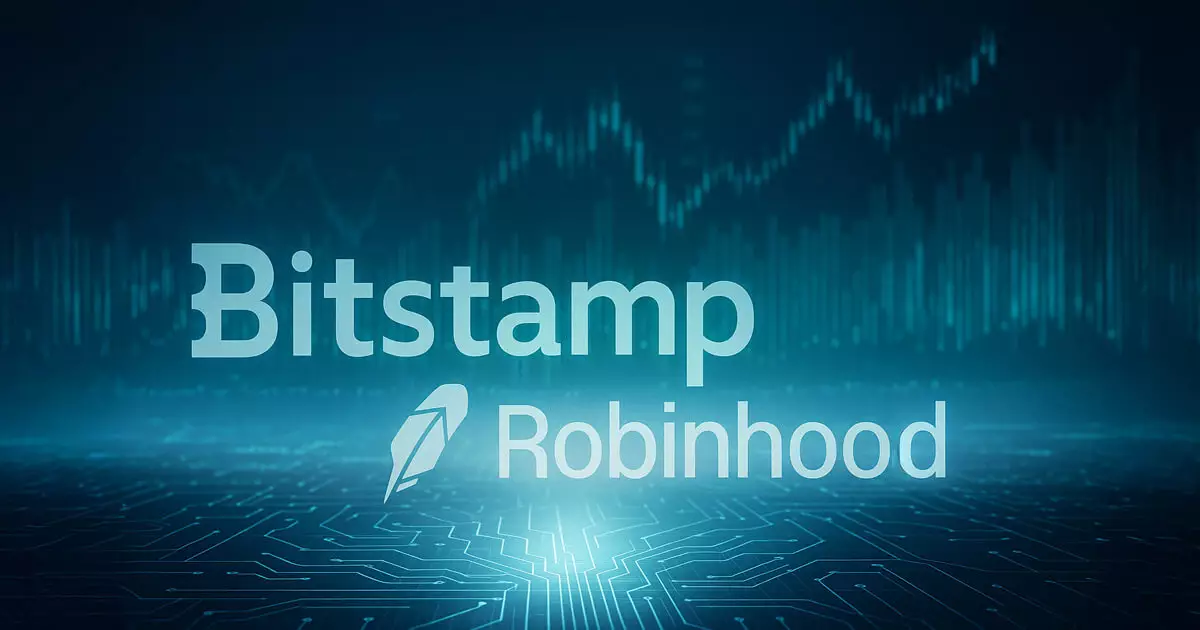In a world driven by rapid innovation and fierce competition, Robinhood’s recent $200 million acquisition of Bitstamp speaks volumes about its ambition to transform from a U.S.-centric trading platform into a formidable global player in the cryptocurrency market. With the deal finalized after a lengthy 12-month process, Robinhood has secured an arsenal of over 50 licenses across multiple continents, a subscriber base of four million, and an entry into the institutional revenue sector. This strategic maneuver is more than just impressive numbers—it’s a profound statement of intent that signals Robinhood’s readiness to embrace the complexities of global crypto trading.
CEO Vlad Tenev’s proclamation that this merger returns a “globally-scaled crypto exchange” to Robinhood highlights a shift in narrative. The company is no longer merely a domestic player; it is poised at the brink of a worldwide expansion, effectively weaponizing the robust reputation that Bitstamp has built since its inception. The departure from primarily focusing on retail clients to now capturing the institutional market is a positive pivot that should not be understated.
Cutting Through Regulatory Red Tape
What stands out about this acquisition is its potential to circumvent years of bureaucratic hurdles for Robinhood. The cryptocurrency industry is notably plagued by a complex web of regulations that hinder operational efficiency. By acquiring Bitstamp, Robinhood effectively inherits over 50 active licenses across Europe, Asia, and the U.S., establishing a foothold that would otherwise require extensive time and resources to secure. This ‘instant passporting’ strategy under Europe’s Markets-in-Crypto-Assets (MiCA) framework is a masterstroke, offering Robinhood immediate access to a burgeoning crypto market.
The timing of this acquisition is equally significant. In February, the U.S. Securities and Exchange Commission closed its long-standing investigation into Robinhood Crypto, thereby removing the last barrier that stood in the way of this merger. With regulatory clouds dissipating, the pathway is now clearer for Robinhood to not only integrate Bitstamp but to scale its operations rapidly.
Expanding the Product Horizon
More than just licenses, the acquisition of Bitstamp opens the door to a broader product suite that Robinhood can leverage. Transitioning from a limited selection of 15 tokens in its U.S. app to an impressive offering of over 85 cryptocurrencies, along with staking and lending services, is a testament to the depth of Bitstamp’s product capabilities. This advancement not only enriches Robinhood’s portfolio but can potentially attract a more diverse customer base, one that ranges from retail enthusiasts to sophisticated institutional investors.
As evident with the competitive landscape that includes established players like Coinbase and Kraken, product diversification is not merely an add-on; it is a necessity for survival in the dynamic crypto ecosystem. In this context, Robinhood’s future strategies will need to emphasize selective product porting into U.S. operations as regulatory clarity unfolds.
The Institutional Goldmine: A New Revenue Stream
Another cornerstone of this acquisition is the introduction of institutional revenue streams, a segment that is often more stable and lucrative compared to the fickle patterns of retail trading. With nearly a quarter of Bitstamp’s trading volumes attributed to high-frequency market makers and family offices, Robinhood is tapping into an established, stickier revenue source that would serve as a buffer against market volatility that frequently affects retail trading.
This expansion into institutional markets is a clear recognition of shifting paradigms within the cryptocurrency space, where the importance of institutional investment cannot be overstated. It signals a maturation phase for Robinhood, positioning the company to not only cater to individual investors but also forge strong relationships with institutional players.
The Competitive Landscape: Digital Wild West or Strategic Battlefield?
While Robinhood’s moves to bolster its capabilities are commendable, it is imperative to acknowledge that it does not operate in isolation. Competitors like Coinbase and Kraken are also making strategic baits; Coinbase holds licenses, whereas Kraken is steadily acquiring its own regulatory approvals without opting for acquisitions. The aggressive stand of other firms like Binance, which faces legal and operational hurdles, adds yet another layer to this intricate ecosystem.
Robinhood must navigate this competitive landscape cautiously to assure both new and existing customers that its ambitious moves can indeed realize the promise of a comprehensive transatlantic crypto marketplace. As the race for regulatory approvals and market share continues, Robinhood’s proactive approach could either elevate it as a leader or pose risks of overreach, especially if integration challenges arise within the newly acquired Bitstamp framework.
In a rapidly changing environment, Robinhood’s aggressive march into the crypto landscape commands attention and respect, set against a backdrop of both opportunity and formidable challenges.















